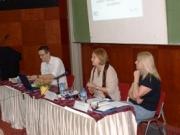Women in the public and political life of BiH – position and perspectives
 A round table discussion was organised today in Tuzla, by Vesta Association, in cooperation with the Fridrich Ebert Foundation, on the theme ˝Women in public and political life – position and perspectives ˝. The objective of this round table is strengthening women's role in the decision making processes.
A round table discussion was organised today in Tuzla, by Vesta Association, in cooperation with the Fridrich Ebert Foundation, on the theme ˝Women in public and political life – position and perspectives ˝. The objective of this round table is strengthening women's role in the decision making processes.
Ms Besima Boric, member of the FBiH Parliament's House of Representatives, spoke on this theme, while sociologist Ms Smiljana Vovna spoke to participants on the theme „Women in politics: facing the obstacles ”. As Ms Vovna stated, a woman's position in the society is certainly influenced by tradition. ˝It is characterised by economic motives as well, with a certain percentage of attitudes shaped by religion, placing a woman, in a way, into a very specific ranking compared to a man. We will certainly touch upon all these aspects during the round table discussion, or at least I will, in my presentation. I would also like to raise the issue of and invite you think about the ways in which we can influence and change the attitudes and positions about women's value, their role and contribution in all walks of life ˝, Ms Vovna said, adding that „If we are talking about the legal framework, there should be 30 percent women in all Houses, Assemblies and Governments, and each political party is trying to meet this minimum requirement ˝.
According to Ms Borić, when we are talking about the position of women in the public and political life in BiH, the situation is improving, and there are improvements too in the formal and legal respect. „Through the legislation and various commissions we have achieved certain results, however they are not satisfactory and are far below the planned quota. I feel that we are constantly somewhere in between, and that there is yet a lot more work to be done in order to ensure a satisfactory level of women's participation, not only in terms of percentages but effects as well. Apart from some 17 percent of women in the parliament, we are absent in the executive authorities for some years now, and women are not present during key developments and events, which is one of the main problems. If a woman is indeed present, she is looked upon with caution, and there are always qeustions as to what is she doing there and how can she contribute?˝, Ms Borić concluded. She also emphasised that despite all her experience she can not be satisfied, but that efforts should be made in the future to democratise political parties internally.


